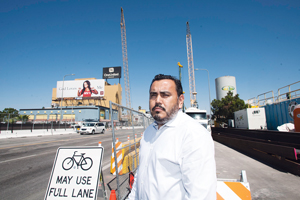
The way Yum Yum Donut Shops Inc. executives see it, they lost $875,000 when their store in Crenshaw closed last year to make way for a new Metro light-rail line.
For more than three decades, Industry-based Yum Yum’s store sat near the intersection of Exposition and Crenshaw boulevards. But the shop, along with 40 other businesses, is now closed, cleared out to make way for the $2 billion Metro Crenshaw-LAX Transit Project.
The process of public entities, such as the Los Angeles County Metropolitan Transportation Authority, taking private property by eminent domain can be a contentious one. What distinguishes the acquisition of the land for the Crenshaw line, though, is that nearly all the land owners and tenants along the route who were forced to move have quietly struck deals and moved on.
All, that is, but Yum Yum, which says it has lost what was an extremely profitable location, and one other property owner. They are fighting on in court.
“I’m surprised oftentimes about how easily some of these things get resolved,” said Joel David Deutsch, partner in the real estate practice at L.A. law firm Jeffer Mangels Butler & Mitchell. “Agencies always tend to undervalue properties. You would think most land owners would fight.”
Deutsch, who is not involved with the Crenshaw project, has represented both public and private entities in eminent domain cases.
There are many reasons why the bulk of the businesses and property owners displaced by the Crenshaw line made way with little fuss. Yum Yum has a singular, compelling reason to stick to its guns.
Lots of dough
The doughnut shop that closed in early December, two days before Metro took possession of its longtime storefront, was one of more than 150 stores Yum Yum operates under the Winchell’s Donut House and Yum Yum flags in California. What distinguishes the one at Crenshaw and Exposition, said Tony Camolina, the company’s vice president of operations, was its profitability.
“It was making good money for the company,” Camolina said. “It definitely hurts our bottom line. This is not a store we were planning to close; we were planning to stay there forever.”
The shop’s revenue topped $721,000, according to court records, and last year it generated net profit of $190,000 – a 26 percent margin. That towers above the 6 percent margin that market research firm IBIS World Inc. estimated as what the average U.S. doughnut store generates today.
That kind of dough wasn’t just handed to Yum Yum. Camolina said the location, strategically positioned on the east side of Crenshaw Boulevard about a mile south of the 10 freeway, catered to hundreds of commuters driving to work each morning on that route. If the doughnut shop wasn’t so convenient for passers-by, profits would likely be much lower.
“We want to be on the morning-commute side of the street,” he said. “People don’t go out of their way to get a doughnut.”
Therein lies the heart of the dispute.
The company said it has had no luck securing a spot nearby that possesses the same qualities. As a result, Yum Yum is seeking $875,000 from Metro for lost profit and good will.
“We had a great store and a perfect location and we had that taken away,” Camolina said. “If it was that easy to find good sites, everyone would have one. It’s easier said than done.”
Metro, in a document filed in Los Angeles Superior Court last month, has dug in on the issue of loss of good will, citing a law requiring businesses to take reasonable steps to find a new location before being entitled to compensation for loss of good will. Metro has questioned how serious Yum Yum’s efforts were during its search.
Metro spokesman Jose Ubaldo declined to comment on specific disputes, saying in an email doing so “would require us to disclose information that could affect Metro’s position in the negotiations, thereby affecting the cost the public would have to pay for those properties needed for the project.”
If a jury determines Yum Yum’s efforts to find a comparable location were reasonable, Metro has estimated in court papers that the loss of good will would only reach as high as $620,000.
Rare scuffles
That the dispute between the doughnut maker and the transit agency has escalated to the point that the parties are scheduled for trial in November is unusual in eminent domain cases.
Historically, only about 13 percent of such disputes drag out long enough to go before a jury, said John Murphy, an attorney representing Yum Yum.
Murphy, a longtime eminent domain attorney and partner at Murphy & Evertz in Costa Mesa, said no mediation hearings are set.
Should the dispute not settle before the court date, Yum Yum would be the second former Crenshaw-line entity to go to trial.
The non-profit Veterans of Foreign Wars Post 2122 had owned its property at 335 E. Florence Ave. in Inglewood since 1931. Metro first offered the group $650,000 for the building but, after a yearlong battle, a Superior Court jury awarded the VFW nearly $3.4 million.
Charles Cummings, a partner at L.A. eminent domain firm Sullivan Workman & Dee, which represented the VFW post, had expected more businesses to go toe to toe with Metro.
“Those who don’t dispute are often people intimidated by the government,” he said. “Most would dispute the offer; it’s just the nature of it.”
